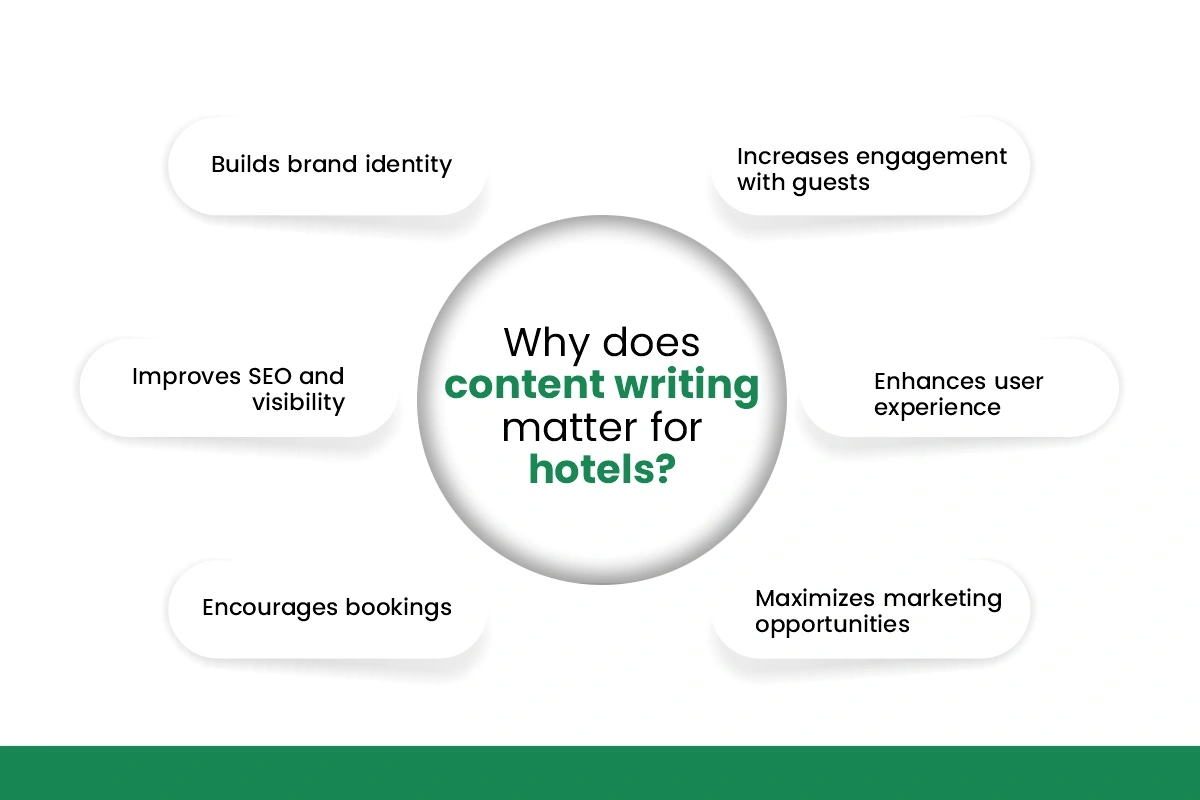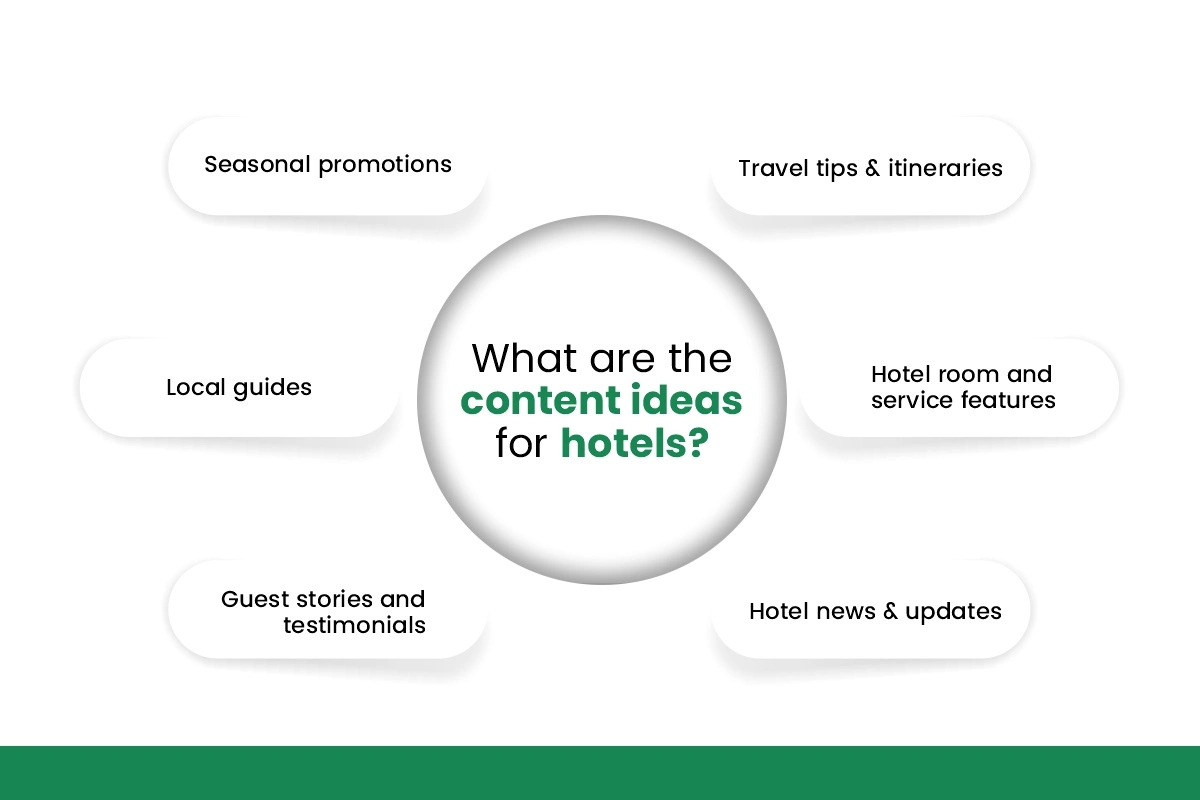#1 SEO Company Dubai
#1 SEO Company Dubai
Sun-Thu: 10 AM to 7 PM - Sat-Fri: Closed

A great hotel website packed with compelling, informative, and SEO-friendly content has a great impact on online presence, engagement, and hotel bookings. With increasing reliance on digital channels, hotels need to be certain that their content is compelling enough to stand in a crowd and strategically optimized to be found.
By adopting a sustainable approach to content, hotels can build their brand, boost engagement between potential travelers, and generate higher conversion rates.
This blog will guide you on how to optimize content for hotels that provides value, build credibility and persuades visitors to stay in your hotel.
Content is more than just a set of words on a page. It is a conversation between hotels and potential guests. Great content writing not only keeps guests informed of services offered, it also builds credibility and increases search rankings.

Here are some of the reasons why content writing matters for hotels:
Different hotels need different forms of different content to address different segments of their potential prospects. An integrated approach to content encompasses a range of different forms of content to address the different needs of different guests.
Some of the types of content for hotels are as follows:
A Hotel's website serves as the main point of reference for all prospective visitors to learn about their services. The website must display strong home-page material in addition to complete room information with amenities listings alongside regional attractions and frequently asked questions and an easy booking process. Strongly written materials on websites produce understanding along with reliability for readers.
A well-maintained hotel blog enables property managers to provide travel-related advice which boosts search engine rankings and lets them connect with potential visitors. The publishing of articles focused on traveller tips, local events and season promotions and guest stories through blogs helps attract and convert potential visitors.
Social media is also used to converse with tourists and promote hotel services. Great pictures, videos, reels, and informative posts help to define ambience, amenities, and guest experiences of a hotel to generate more booking and sharing.
Through promotional emails addressed to past customers hotels can remind the audience about new programs and seasonal discounts along with upcoming events. Business relationships strengthen through strong emails which result in repeated customers.
A hotel requires an excellent search engine optimization approach to get its content properly positioned on search results and target the right customers. Hotels that follow specific SEO practices gain better online visibility due to which they attract organic visitors which eventually leads to more direct reservations.
The following essential SEO strategies should be used when writing hotel content:
Creating diverse and interesting content keeps hotels up to date and engages different groups of tourists. A well-planned content strategy ensures that guests find valuable information, feel connected to the hotel, and are encouraged to book a stay.

Some of the compelling content ideas are as follows:
To ensure that a hotel’s content strategy is effective, it’s essential to track its performance and measure success. By analyzing the right metrics, hotels can refine their content strategy, attract more guests, and improve overall engagement.
The beginning of measuring content success is having set goals. Hotels must set cut-and-dry goals, i.e., more website visitors, more engagement, or more direct bookings. With measurable objectives, i.e., a 20% boost in organic traffic in six months or a 10% boost in conversion, hotels can accurately assess their progress and adjust their content marketing accordingly.
Hotel operators need to monitor their key performance indicators (KPIs) regularly because it helps them evaluate the effectiveness of their content. A hotel needs to monitor website traffic and page duration as well as social media interactions and email recipient actions and booking success metrics. These indicators let's hotels create content that best engages their audience so they can achieve their optimization targets.
SEO performance acts as a vital factor which determines the effectiveness of content. Hotels need the combination of Google Analytics and SEMrush tools to monitor keyword positions along with organic site visits and webpage strength measurement and backlinks evaluation. A hotel achieves the highest search engine credibility and generates more potential visitor traffic when they optimize their SEO approach according to key phrases which produce maximum search volumes.
The level of audience engagement rises from reorganized content so hotels need to track engagement metrics across their various channels. Social media sharing, likes, comments, and direct messages determine to what extent content is engaging their audience. Further, guest reviews, survey responses, and email open rates can also provide useful input regarding preferences and expectations of potential visitors.
Ultimately, the determining factor of the success of content marketing is to produce a return on investment (ROI) and produce conversions. The hotels must monitor direct booking rates, call-to-action clicks, and revenue secured through content efforts. Measuring campaign effectiveness through content enables hotels to refine their strategies and apply their resources to work in their most productive content campaigns.
Effectively producing hotel content demands precise organizational work and implementation strategies. The wrong actions made by hotel management systems reduce both guest acquisition power and search engine rankings.
Several critical mistakes that should be avoided during the process are as follows:
High-quality, SEO-optimized content is a powerful tool for hotels looking to enhance their digital presence and drive more bookings. By avoiding common mistakes and focusing on engaging and well-structured content, hotels can improve their online visibility and create a strong connection with potential guests.
For hotels that want to maximize their content marketing potential, partnering with BeinSeo ensures expertly crafted, results-driven content. Start optimizing your hotel’s content strategy today and attract more travelers with engaging, well-optimized content!
© copyright 2025 All rights reserved. BeinSEO